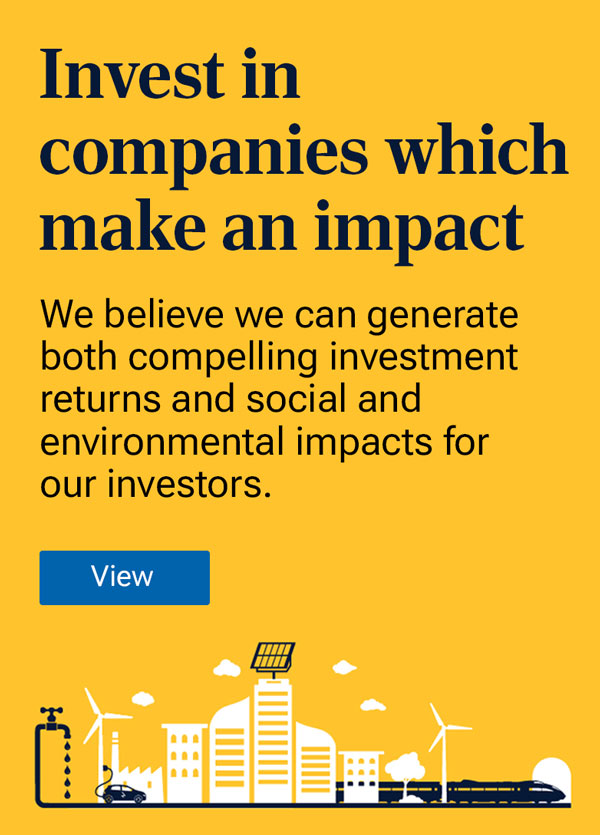March 2024 / IMPACT INVESTING
Meet Hari Balkrishna
Hari believes investors are ready to make a more active choice to favor companies that can deliver positive environmental and social impact
With 18 years of investment experience and a passion for environmental and social impact, Hari Balkrishna is well equipped to manage the Global Impact Equity Strategy. He believes the market is ready for investors seeking to make a more active and conscious choice to favor companies that can deliver positive environmental and social impact.
Q: Tell us about your background and how you started your investment career.
After finishing my bachelor’s degree, I knew that I wanted to work in asset management as I always loved the accountability and game theory of financial markets but wasn’t quite able to break in right after university. I instead spent four years in investment banking in Sydney, Australia, with Goldman Sachs before deciding that it wasn’t for me and applied to business school—to globalize my knowledge base and to break into professional asset management.
During my time pursuing an M.B.A. at Harvard Business School, I completed a summer internship with T. Rowe Price working as an analyst in the London office. I covered the banking sector, which was undergoing huge change after the global financial crisis in 2008. Upon gaining my M.B.A., I accepted a role as an investment analyst at T. Rowe Price covering European and Canadian banks, autos, and real estate.
Prior to my role as portfolio manager for the Global Impact Equity Strategy, I was an associate portfolio manager for the Global Growth Equity Strategy for six years, working with Scott Berg. This was a fantastic grounding in globalizing one’s investment knowledge across sectors, but more importantly in building and deepening working relationships with all our analysts, sector portfolio managers, and diversified portfolio managers around the world.
Q: What attracted you to impact investing?
At a personal level, having lived and worked in five different continents, I have built an appreciation for different social constructs and have always been a passionate believer in solving for climate change. The strategy was born through our desire to contribute in a positive way to the challenges our planet and society face today. We believe impact investing is the most direct way we can address these challenges—via conscious action, engagement, and skilled execution. It goes beyond simply owning and capturing the economics and activities of certain types of companies. Capital must also be directed toward desired impact outcomes, alongside engaging with company management and active proxy voting to help achieve the best results.
Impact investing also brings a nonfinancial dimension to the investment process—a values‑based approach that seeks positive environmental and/or social impact as part of distinct performance targets and is material, measurable, and additional. We believe that impact investing is key to pursuing companies engaged in societal and environmental change. Capital can be directly deployed into companies that seek positive impact and are change‑enabling. But this has to be combined with fundamental analysis, deep research, and valuation discipline.
Q: Can public equity investing really make an impact on key environmental and social concerns, especially compared with private investing?
While impact investing was originally the domain of private investors, we believe the potential to capture and create impact in public equity markets has broadened tremendously over the past decade.
Ambitious international and local goals are being set on environmental and social initiatives to directly address risks and promote change. Among them are the UN Sustainable Development Goals (SDG), a globally recognized framework that aims to end poverty, protect the planet, and ensure prosperity. On its own, it is estimated that approximately USD 5 to 7 trillion of capital will be needed annually until 2030 to achieve the UN SDG objectives.1
If we aspire to accelerate these and other initiatives that target social and environmental transitions, it is essential to fund them at scale and in a liquid manner—so public equity markets will be critical to that effort. The enormity of issues like clean energy transition will not be possible without the backing of large and well‑funded publicly listed firms.
Excitingly, the opportunity to own businesses that create a positive environmental or social impact is greater than ever before in public equity markets, as companies should shift investment to address environmental and societal pressure points.
Q: How do you make a difference for clients as an impact investment manager?
We aspire to be a partner to our clients, using our full breadth of ideas in seeking to harvest both impact and potential alpha over the long term. Impact investing has grown tremendously in recent years, in part because investors are not being asked to accept a sacrifice of returns in order to implement a values‑based approach.
Part of my role as an impact portfolio manager is to help individuals and institutions make sense of what’s happening in the world around us and how that could manifest into risks and opportunities within an investment portfolio. For example, as the environmental costs of climate change accelerate, planning for the future and thinking about climate mitigation can genuinely help a company’s bottom line.
As businesses become more conscious and active in aligning capital with the economic returns that can legitimately flow from addressing environmental or social tensions, I expect opportunities to grow.
That is important because breadth is a key foundation of consistency and meeting the return objectives of impact investing. In short, we are in an era of growth with respect to the opportunity set of impact stocks, and it is a privilege to help our clients access these opportunities.
From an alpha perspective, we also believe impact‑oriented companies can offer better topline and bottom‑line growth opportunities than the index. Often these companies have products that are in high demand from consumers, but also have business models that regulators wish to incentivize as we try to achieve net zero targets.
Q: Can an investment manager contribute to positive impact?
Impact is achieved within an investment portfolio in more ways than simply owning and capturing the economics and activities of certain types of companies. It involves directing fresh capital toward desired impact outcomes, alongside impact‑oriented company engagement, proxy voting, and the associated feedback loop.
As a starting point, we screen companies through an impact lens for both materiality and measurability of the desired outcome. This requires an understanding of a business in the context of a defined impact framework. For us, this is driven by a combination of evaluating a company’s current and future operations and the alignment of earnings or revenues with our impact pillars and the UN SDGs. We use the word “future” very deliberately, given the rapid evolution of many businesses and the need to look forward.
Importantly, as a truly global asset manager, we are ready to supply new capital to areas of target impact. We use our position of ownership to enter into dialogues with companies where we can see the potential for them to accelerate the good aspects of their operations, while mitigating the negative parts that naturally exist even in the purest of business operations. Change takes time and requires resilience, but this is consistent with many aspects of successful long‑term investing.
Q: How does your portfolio differ from the theme/factor of ESG, sustainability, or even impact?
It is important to distinguish that impact investing is not environmental, social, or governance (ESG) integration, and it is also a different discipline from sustainable investing. It incorporates both, but takes it a step further. Impact investing in public equity markets lives in the same domain as other styles of investing. We do not believe there needs to be a sacrifice of return potential, and we believe the opportunity set is unrecognizable from a decade ago. Impact investing is also outward‑looking (planet and society) and forward‑looking compared with ESG integration and sustainability, which tend to look at a company’s own operations much more.
But impact investing backed by stock picking outcomes requires equal, if not greater, levels of due diligence to avoid excessive concentration, crowding, and disappointment. A forward‑looking perspective, a stable and expert research foundation, and a good level of imagination are key features of successful investment processes.
Q: What does the future look like for impact investing?
Change is often born of extremes—and we are living in a period of extremes in many respects. The challenges of our era have created open and broad debate about the rights and freedoms of humankind, the growth in inequality, and the clear and obvious pressures on our environment. To this point, rarely have society and investors mobilized in the way we have seen in the past four years, with clear and raised expectations as to how businesses should conduct themselves in the context of the societies and the environments in which they operate.
We are encouraged by the significance and action businesses are applying to demands for new and improved principles. Companies are innovating in response to society’s demands for solutions to pressing issues, and industry leaders are adapting in recognition of their responsibilities. This has created an increasing number of opportunities to access positive impact within public equity markets.
Q: Share with us your personal interests and how they might (or might not) intersect with your professional work.
I strongly believe in the importance of work‑life balance. I have two children with a range of interests, and I enjoy spending as much time with them as possible, especially playing cricket and squash with them. I also love cycling, playing squash, and badminton.
I cochair the London Corporate Responsibility Committee, which is an opportunity to allow T. Rowe Price associates to have an impact on our local communities. It is extremely rewarding work where we can make a real difference to the communities around us. Volunteering and charity work is also a daily reminder of the purpose of impact investing—trying to channel capital toward making a difference and making the world a better place.
IMPORTANT INFORMATION
This material is being furnished for general informational and/or marketing purposes only. The material does not constitute or undertake to give advice of any nature, including fiduciary investment advice, nor is it intended to serve as the primary basis for an investment decision. Prospective investors are recommended to seek independent legal, financial and tax advice before making any investment decision. T. Rowe Price group of companies including T. Rowe Price Associates, Inc. and/or its affiliates receive revenue from T. Rowe Price investment products and services. Past performance is not a reliable indicator of future performance. The value of an investment and any income from it can go down as well as up. Investors may get back less than the amount invested.
The material does not constitute a distribution, an offer, an invitation, a personal or general recommendation or solicitation to sell or buy any securities in any jurisdiction or to conduct any particular investment activity. The material has not been reviewed by any regulatory authority in any jurisdiction.
Information and opinions presented have been obtained or derived from sources believed to be reliable and current; however, we cannot guarantee the sources’ accuracy or completeness. There is no guarantee that any forecasts made will come to pass. The views contained herein are as of the date noted on the material and are subject to change without notice; these views may differ from those of other T. Rowe Price group companies and/or associates. Under no circumstances should the material, in whole or in part, be copied or redistributed without consent from T. Rowe Price.
The material is not intended for use by persons in jurisdictions which prohibit or restrict the distribution of the material and in certain countries the material is provided upon specific request. It is not intended for distribution to retail investors in any jurisdiction.
March 2024 / GLOBAL FIXED INCOME


